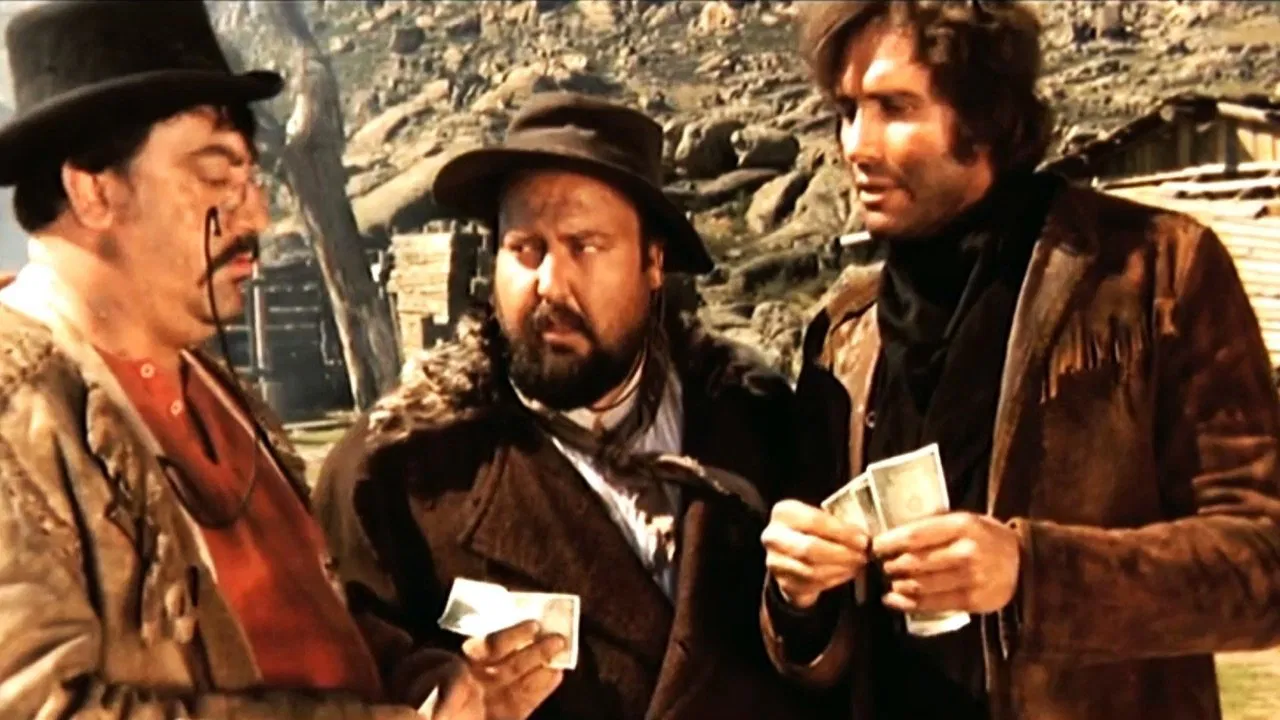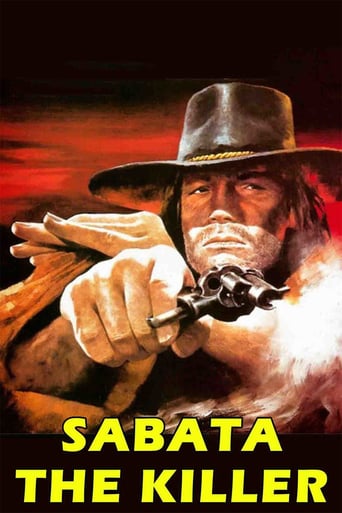

Slow pace in the most part of the movie.
... View MoreA lot of perfectly good film show their cards early, establish a unique premise and let the audience explore a topic at a leisurely pace, without much in terms of surprise. this film is not one of those films.
... View MoreJust intense enough to provide a much-needed diversion, just lightweight enough to make you forget about it soon after it’s over. It’s not exactly “good,” per se, but it does what it sets out to do in terms of putting us on edge, which makes it … successful?
... View MoreA terrific literary drama and character piece that shows how the process of creating art can be seen differently by those doing it and those looking at it from the outside.
... View More"Gunmen of Rio Grande" director Tulio Demicheli's bloodthirsty European horse opera "Sabata the Killer" shouldn't be confused with either of the two Lee Van Cleef "Sabata" westerns helmed by Gianfranco Parolini or Parolini's own retitled "Adios, Sabata," with Yul Brynner, which was originally entitled "Indio Black." Demicheli's western concerns a "Good, the Bad, and Ugly" trio-Peter Lee Lawrence, Anthony Steffen, and genre stalwart Eduardo Fajardo. Peter (Peter Lee Lawrence of "For A Few Dollars More) plays a bank clerk with a gambling addiction that lands him deeply in debt with the town's leading citizen, Garfield (Alfredo Mayo of "Hell's Commandos"), and nothing that he does seems to deliver him from his problem. One day, two gunslinging bank robbers cruise into town. Sabata (Anthony Steffen of "Stranger's Showdown") and Mangosta (Eduardo Fajardo of "The Mercenary") hold up Garfield's bank. The local newspaper The Globe publishes an account of the robbery, and Sabata and Mangosta are upset when they read that $5-thousand dollars was taken. By twists and turns, Peter winds up in cahoots with these two outlaws who cruise the Southwest in a convertible Ford touring car. Although neither Demicheli nor his scenarists establish a chronological date for this Italian, Spanish, and German co-production, "Sabata the Killer" looks like it takes place around the same time that Sam Peckinpah's fracas "The Wild Bunch" occurred, since they use automobiles and wield pump-action shotguns. Demicheli never lets the action lag, so you're in one spirited shoot'em up after another, while our threesome struggle with the question of how to divide the loot up among themselves. Mangosta ranks as the most interesting character of the three; this sneaky Mexican loves to knit when he isn't shooting adversaries. Unlike most Spaghetti westerns about greed and money, "Sabata the Killer" doesn't let anybody get away with their crimes. After our three anti-heroes mow down a small army of Americans below the border in Mangosta's village, they turn on each other, and the film concludes with all the money that they fought over getting scorched in a fire, while they don't fare much better. Altogether, "Sabata the Killer" isn't a bad European western. Indeed, it goes against the grain, since everybody appears to bite the dust. Demicheli and co-scenarists Florentino Soria and Nino Stresa of "Viva! Django" punish everybody involved with the money, which sets it apart from countless other westerns. "Garringo" lenser Aldo Ricci's widescreen cinematography is fine, and the cast is as solid as a Spaghetti western can possibly be with the leading threesome who were seasoned stars in their own right of several Spaghetti westerns. The production itself looks really good, too. "Relentless Four" composer Marcello Giombini provides a catchy orchestral soundtrack that enlivens the action. This is an above-average production in terms not only of the cast but also the lush production values.
... View MoreThis is an entertaining as well as comical Chorizo Western that packs stirring adventures , shootouts , riding chases , vengeance , treason and is pretty amusing . Paella/Ravioli Western starred by ordinary actors and a plethora of familiar faces in the support cast . It deals with a duo of robbers called Sabata (Anthony Steffen) and Mangosta (Eduardo Fajardo) who carry out a bank robbing . They assault a bank and escape by car . The newspapers publicize ¨the bandits took 5.00 dollars from bank assaulted¨. But they learn the bank cashier called Peter (Peter Lee Lawrence) has taken some dollars . Peter is a card player who has an abundant debt to a powerful owner called Garfield (Alfredo Mayo) . Sabata and Mangosta go after Pedro who is caught , they then form an amusing trio to proceed hold-ups and assaults . As Pedro agrees with them to assault an armored stagecoach . They take money and gold but a posse led by Garfield pursues them . The threesome decides to hide the gold at a mine . Later on , the trio is detained and about to be hanged , but they are spontaneously freed by the posse . This forgotten S.W. packs thrills , action , humor and lots of shots and gunplay . All in all, this film is predominantly a Spanish film rather than an Italian one. It's a two country co-production but is clearly dominated by the Spanish contingent and the traditional leanings of the Spanish producers of the time have their stamp on the entire proceedings . There is plenty of action and humor with tongue firmly in cheek , guaranteeing shoot'em up , riding pursuits or stunts every few minutes . It's an exciting SW with breathtaking showdown between the protagonists Steffen/Lee Lawrence/Fajardo and the enemy led by Alfredo Mayo and his hoodlums , including a thrilling ending when happens shootouts , surprises and double-crosses . The picture is well starred by Anthony Steffen-Antonio De Teffe- , he plays Sabata but no relation to Lee Van Cleef's Sabata role ; Steffen began playing secondary roles into typical examples of popular Italian films of the late 50s as sword and sandal epics , comedies, adventures and was with spaghetti westerns that renamed achieved worldwide stardom . His acting is often accused of being wooden, but in many manners is ideally suited to playing the steely-faced gunslinger synonymous with the genre . His others successes include well liked features as ¨Seven Dollars to Kill¨ , ¨The last Mohican¨, ¨Train for Durango¨, ¨Gentleman Jo¨ , ¨Four dollars for Django¨, ¨Shango¨, ¨Arizona colt¨, ¨Apocalypse Joe¨ and several others . Blond German youth Peter Lee Lawrence, who made his uncredited debut in Sergio Leone "For A Few Dollars More" (1965), was the hero in many Spaghetti Westerns. His short cinematographic history can be enclosed in nine years of Italo-Spain co-productions such as "More Dollars for the MacGregors" , ¨Winchester justice¨,"Pistol for a Hundred Coffins", ¨The man who killed Billy the Kid¨ , ¨Fury of Johnny Kid¨ and several others . However , Eduardo Fajardo steals the spectacle as a likable Mexican with moustache , earring and knitting, being magnificently interpreted by this veteran Spanish secondary actor . In addition , there appears usual secondaries of Spanish/Italian Western , including customary actors such as Alfredo Mayo , Chris Huerta , Tito Garcia , Alfonso De La Vega , Rafael Albaicín , Jose Canalejas , Alvaro De Luna , Jose Riesgo , Miguel Del Castillo , Xan Das Bolas , Emilio Rodriguez , Luis Induni and many others . There are many fine technicians and nice assistant direction and excellent production design , a magnificent scenario on the villages , ranch , and barren outdoors , rocky mountains , dirty landscapes under a glimmer sun and fine sets filmed in Manzanares Del Real , Colmenar Viejo and La Pedriza , Madrid . Evocative cinematography by Aldo Rizzi , showing marvelously the habitual Manzananes Del Real and Pedriza outdoors , but no Almeria . Marcelo Giombini composes a vivid Spaghetti soundtrack and well conducted , including a jolly leitmotif ; it's full of fun sounds and lively score . Definitely a worthy topic but, well done correctly interpreted and euro-western of the final period which, although far from the postulates Leonianos .This is one of the uncountable Western that the Spanish producers pioneers were joined by Italian producers , who established around Madrid , especially to shoot the exteriors, a new stable center for filming westerns . The Argentinian , nationalized Spanish writer/filmmaker Tulio Demicheli so consistently mixed the good with the mediocre that it became quite impossible to know what to expect from him next . He directed other Gazpacho Westerns such as ¨Tequila¨, ¨1 , 2, 3 Dispara otra Vez¨, ¨Un Hombre Un colt¨ and ¨Gunmen of Rio Bravo¨. Demicheli had a long , prolific career , working from the 40s , he directed all kind of genres as drama as ¨Herida Luminosa¨ , Thriller as ¨Ricco¨ , adventures as ¨Son of Captain Blood¨, ¨First adventure¨ , Spy sub-genre as ¨¨Il Nostro Agente a Casablanca¨, ¨Dirty game in Panama¨ , ¨Misión Lisboa¨ , Giallo as ¨Coartada en Disco Rojo or Two faces or fear¨ , Horror as ¨Monstruos De Terror¨ or ¨Assignment Terror" . His best movie was ¨Carmen of Ronda¨ with Sara Montiel . ¨Arriva Sabata¨ results to be a passable Paella western with acceptable production , adequate cinematography , ordinary players and catching musical score . Rating : 6 .
... View More